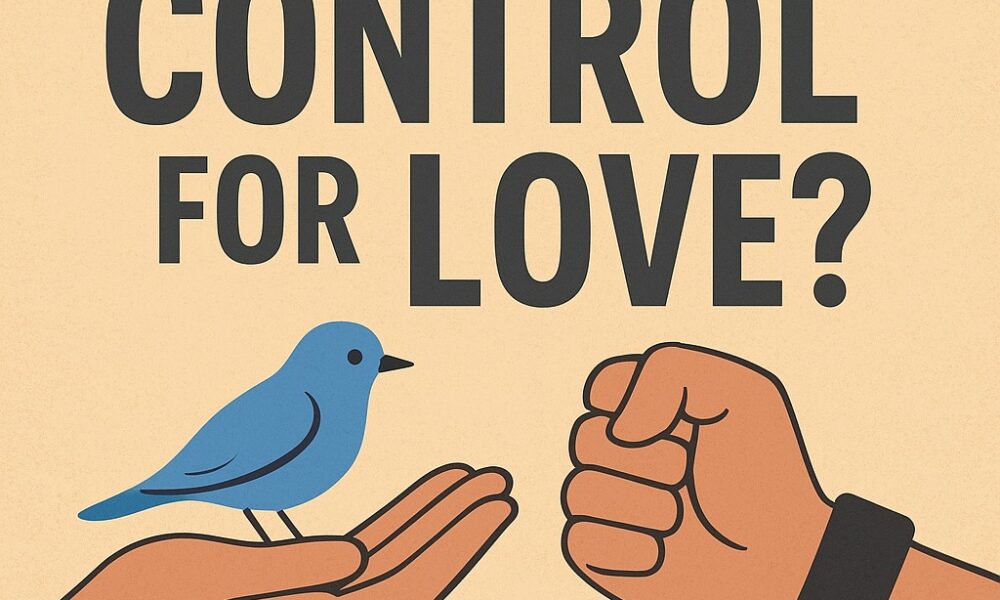Are You Mistaking Control for Love?
Are You Mistaking Control for Love?

Love is often described as warm, freeing, and nurturing. Yet, many relationships—romantic, familial, or even friendships—carry a subtle undercurrent of control disguised as care. Sometimes, people believe they are being “protective” or “responsible,” when in reality, they are holding the other person hostage to their own fears, insecurities, or expectations.
But here’s the real question: are you mistaking control for love?
This blog explores the fine line between genuine love and unhealthy control, why people confuse the two, and how to build relationships based on trust, respect, and freedom.
What Does Real Love Look Like?
Love is not ownership. It’s not about bending someone to your will or making them fit a perfect mold. Instead, love thrives when there’s respect, acceptance, and space for individuality.
A healthy form of love includes:
- Mutual respect: Recognizing differences without trying to change them.
- Trust: Believing in each other without constant suspicion.
- Support: Encouraging growth, even when paths differ.
- Freedom: Allowing each person to make choices without fear.
- Safety: Emotional and physical security without manipulation.
If these ingredients are missing, what we often call “love” might just be control in disguise.
How Control Masquerades as Love
The line between love and control is blurry because controlling behavior often comes cloaked in seemingly positive intentions. A partner might say:
- “I just want what’s best for you.”
- “I only check your phone because I care.”
- “I need to know where you are so I don’t worry.”
At first glance, these statements sound like love. But when you peel back the layers, you often find insecurity, fear, and the desire for dominance.
Control often hides under the following masks:
1. Overprotection
When someone insists on making all your decisions “for your own good,” it feels like care. But too much protection denies your independence and ability to grow.
2. Possessiveness
Jealousy is often mistaken for passion. “I can’t stand seeing you with anyone else because I love you so much.” In truth, this is about ownership, not love.
3. Decision-Making Power
One partner always decides where to go, what to eat, or how money is spent—under the excuse of being “more responsible.” Slowly, your voice disappears.
4. Constant Monitoring
Frequent calls, texts, or tracking your location might feel like care at first. But when it turns into surveillance, it’s control.
5. Conditional Affection
“You’ll only get my love if you behave the way I want.” Real love isn’t conditional—it doesn’t vanish when you make mistakes or assert yourself.
Why Do We Confuse Control with Love?
The confusion is deeply rooted in culture, upbringing, and personal insecurities.
1. Cultural Norms
In many societies, love is portrayed through sacrifice and possession. A partner who checks your every move is seen as “deeply caring.” In reality, this normalizes control.
2. Family Influence
If you grew up in a controlling household—where love meant rules, punishments, and surveillance—you might think this is the natural way relationships work.
3. Fear of Loss
People often control out of fear—fear of losing the partner, fear of betrayal, fear of abandonment. Instead of dealing with insecurity, they use control to create a false sense of stability.
4. Romantic Myths
Movies and dramas glorify jealousy and obsession as “true love.” We internalize these ideas and start accepting toxic behavior as passion.
5. Low Self-Esteem
Those with low self-worth may allow controlling behavior because they believe they don’t deserve freedom, or they cling to control because they fear being replaced.
The Emotional Impact of Control
Mistaking control for love is not harmless. Over time, it leaves deep scars.
- Loss of Identity: You stop knowing who you are outside the relationship.
- Anxiety and Fear: Constantly worrying about disappointing or angering the other person.
- Resentment: Feeling suffocated but unable to express it.
- Dependency: Believing you can’t survive without the controller.
- Isolation: Being cut off from friends, family, and outside support.
This is not love. It’s emotional imprisonment.
Red Flags: Signs You’re in a Controlling Relationship
Not sure whether what you’re experiencing is control or care? Look out for these warning signs:
- You feel guilty for having boundaries.
- Your choices are dismissed or overridden.
- They demand constant updates on your whereabouts.
- You’ve lost touch with your friends or hobbies.
- They use anger, silence, or withdrawal to punish you.
- You feel more anxious than happy around them.
- They say “I love you” but their actions feel suffocating.
If most of these resonate, chances are—you’re confusing control for love.
Are You the One Controlling?
It’s also important to look inward. Sometimes, without realizing it, we become the controlling partner.
Ask yourself:
- Do I get upset if my partner spends time with others?
- Do I believe I know what’s best for them in every situation?
- Do I check their phone or social media behind their back?
- Do I make decisions without asking for their input?
- Do I withdraw affection when they don’t do what I want?
If you answered yes, it may be time to reflect on whether your “love” is mixed with control.
Breaking the Cycle: From Control to Love
The good news is: control doesn’t have to define your relationship. With awareness and effort, you can shift from controlling patterns to healthier love.
1. Build Self-Awareness
Notice when you feel the urge to control. Ask yourself, “Am I acting from love or from fear?”
2. Practice Trust
Remind yourself that trust is the foundation of love. Give your partner the benefit of the doubt.
3. Respect Boundaries
Understand that your partner has a right to personal space, choices, and individuality.
4. Communicate Honestly
Instead of controlling, share your feelings openly:
- Instead of “Don’t go out with your friends,” try, “I feel anxious when you’re out, and I’m working on it.”
5. Heal Insecurities
Often, control is rooted in past wounds. Therapy, self-reflection, or journaling can help heal those fears.
6. Redefine Love
Shift your mindset: love is not possession. Love is letting someone be free, knowing they choose to stay.
When Control Turns Toxic

Sometimes, control goes beyond emotional manipulation and becomes abuse. If you feel unsafe, trapped, or constantly afraid, it’s not just controlling—it’s toxic and harmful.
In such cases:
- Reach out for support from trusted friends or family.
- Consider professional help such as counseling or therapy.
- Prioritize your safety above all.
Love should never hurt. If it does, it’s not love—it’s control, fear, or manipulation.
Love Without Control: What It Feels Like
When you experience love without control, it feels profoundly different.
- You breathe easier.
- You feel safe being yourself.
- Your individuality is celebrated, not suppressed.
- You are trusted, not monitored.
- You are supported, not directed.
- You grow together, not at the cost of your freedom.
That is the love worth keeping.
Final Thoughts
The difference between love and control is subtle but life-changing. Many people live their entire lives mistaking control for love—accepting suffocation in the name of care, or inflicting restrictions in the name of protection.
But real love doesn’t clip wings; it gives them room to fly.
Real love doesn’t cage; it trusts.
Real love doesn’t own; it chooses, every day.
So, ask yourself honestly: Are you mistaking control for love—or are you ready to embrace a love that sets you free?
Are You Mistaking Control for Love?
In the labyrinth of human relationships, we often find ourselves searching for a compass, a guiding star to navigate the complex emotional terrain. We seek connection, intimacy, and a bond that feels both safe and exhilarating. But what happens when the lines blur? What if the very things we interpret as signs of love are, in fact, the subtle threads of control, weaving a tapestry of manipulation and emotional entrapment?
It’s a question that many of us grapple with, perhaps without even realizing it. We’ve been conditioned by romantic comedies, dramatic novels, and even the stories of our elders to believe that love is possessive, that it’s about a deep, all-consuming attachment where two people become one. We are told that jealousy is a sign of passion, that a partner wanting to know your every move is a testament to their care, and that giving up your own identity for the sake of the relationship is a noble sacrifice.
But this narrative is a dangerous one. It can lead us down a path where we mistake control for affection, where we confuse ownership for commitment, and where we sacrifice our well-being for a distorted version of love.
The Subtle Signs of Control
Control doesn’t always announce itself with a bang. It often creeps in quietly, disguised as concern, protection, or even intense devotion. It can be hard to spot, especially in the early stages of a relationship when the flush of new love can blind us to red flags. So, let’s peel back the layers and examine some of the subtle, and not-so-subtle, signs that you might be mistaking control for love.
1. The “I’m Just Worried About You” Tactic
A loving partner will be concerned for your safety and well-being. A controlling partner will use this concern as a pretext to monitor your actions and limit your freedom.
- Love: “Text me when you get home so I know you’re safe.”
- Control: “Why haven’t you texted me yet? Who are you with? I’ve been calling you for an hour, what’s wrong with you?”
This often escalates. The “worry” becomes a justification for demanding your phone password, monitoring your social media, or even dictating who you can and cannot see. The subtext is: “I don’t trust you, and I need to control your every move to feel secure.”
2. The “We’re a Team” Justification
In a healthy relationship, two individuals form a team, supporting each other’s separate goals and dreams. In a controlling one, “being a team” means sacrificing your own identity for the sake of the partnership.
- Love: “I’m so proud of you for getting that promotion! How can I support you?”
- Control: “That promotion will take too much of your time away from us. I think you should turn it down. Our relationship should be your priority.”
This can manifest in subtle ways, like a partner who “jokingly” belittles your hobbies or career goals, or who expresses disappointment when you spend time with friends or family instead of them.
3. The Jealousy-as-Passion Fallacy
We’ve been told that a little jealousy is a good thing—it shows a partner cares. But there’s a world of difference between a fleeting moment of insecurity and a pattern of possessiveness.
- Love: “I get a little jealous when you talk about your ex, but I know it’s just my insecurity. I trust you completely.”
- Control: “Who was that you were talking to? Are you interested in them? I don’t want you talking to other people like that. It makes me uncomfortable.”
Controlling jealousy is a form of punishment. It’s designed to make you feel guilty for simply interacting with others. The message is clear: “You belong to me, and I dictate who you can and cannot engage with.”
4. The “I’m the Only One Who Understands You” Claim
This is a classic manipulation tactic. The controlling partner isolates you from your support system by convincing you that they are the only person who truly “gets” you.
- Love: “Your friends are so great. I’m glad you have such a strong support system.”
- Control: “Your friends don’t understand you like I do. They’re a bad influence. You should spend less time with them.”
This can be incredibly insidious, as it’s often framed as a compliment. They’re not “jealous” of your friends, they’re “protecting” you from people who “don’t have your best interests at heart.”
5. The Financial Control
Money is a powerful tool for control. A partner who dictates how you spend your money, prevents you from working, or demands access to your accounts is not building a partnership—they’re building a cage.
- Love: “Let’s work together on a budget. We’re a team.”
- Control: “I’ll handle all the money. You don’t need to worry about it. Just give me your paycheck and I’ll take care of everything.”
This can leave you financially dependent and unable to leave the relationship, even if you want to.
The Psychology Behind Control
Why do we fall into these patterns? The answer is often rooted in our own past experiences and psychological makeup.
- Low Self-Esteem: Individuals with low self-esteem are often more susceptible to manipulation. A controlling partner’s “intense” love can feel like the validation they’ve always craved.
- The Need for Security: We all crave a sense of safety and stability. A controlling partner can present their controlling behavior as a form of security, a way to “protect” you from the big, scary world.
- Normalization of Unhealthy Behavior: If you grew up in a household where control, manipulation, or emotional abuse were present, you might not recognize these behaviors as unhealthy. They may feel “normal” or even “loving.”
- Codependency: Codependency is a pattern of behavior in which one person enables another’s self-destructive behavior. In a controlling relationship, one partner may find a warped sense of purpose in “fixing” or “saving” the other, while the controlling partner thrives on the power imbalance.
Breaking the Cycle
Recognizing that you’re in a controlling relationship is the first and most difficult step. But what comes next?
- Acknowledge and Validate Your Feelings: Don’t dismiss your feelings of unease, fear, or resentment. Your gut instinct is often the most reliable compass. If something feels wrong, it probably is.
- Talk to a Trusted Friend or Family Member: Isolation is a key tool of control. Break the cycle by reaching out to someone you trust. A third-party perspective can provide clarity and support.
- Seek Professional Help: A therapist or counselor can help you understand the dynamics of your relationship, develop a safety plan if needed, and rebuild your self-esteem.
- Set Boundaries: Start small. “I’m going to spend Saturday afternoon with my friends, and I won’t be checking my phone.” A healthy partner will respect this. A controlling partner will test it. Their reaction will be a clear indicator of the relationship’s health.
- Focus on Yourself: Reconnect with the person you were before the relationship. Rediscover your hobbies, your friends, and your passions. Reclaim your identity.
How to Build Love That Lasts Without Control
To move from control-driven relationships to healthy ones, both partners need to shift their mindset. Here are a few practical habits to nurture freedom-based love:
- Celebrate Differences Instead of Fixing Them
You don’t have to agree on everything. Love doesn’t mean sameness—it means learning to appreciate uniqueness. If your partner enjoys something you don’t, let them pursue it without guilt. - Shift From “Me” to “We” Without Losing Yourself
In controlling relationships, one person often dominates. In healthy love, there’s a balance between individuality and togetherness. Each person maintains their identity while contributing to the partnership. - Practice Daily Check-ins Without Surveillance
Instead of constant monitoring, try intentional check-ins: “How was your day? What’s something that made you smile today?” This builds connection without suffocation. - Learn the Art of Letting Go
Sometimes, the greatest act of love is stepping back and allowing your partner to make mistakes, learn, and grow on their own terms.
When you build a love that thrives without control, you create a space where both hearts feel secure, respected, and truly free. That’s the kind of love that not only survives but grows stronger with time.
Love vs. Control: A Final Thought
True love is not about ownership or possession. It’s about two whole, independent people choosing to walk a path together. It’s about respect, trust, and mutual growth. It’s about celebrating each other’s freedom, not restricting it.
The next time you feel a pang of unease, a flicker of doubt, or the weight of an unspoken expectation, ask yourself: Is this love, or is this control? The answer might be the most liberating truth you’ll ever discover










